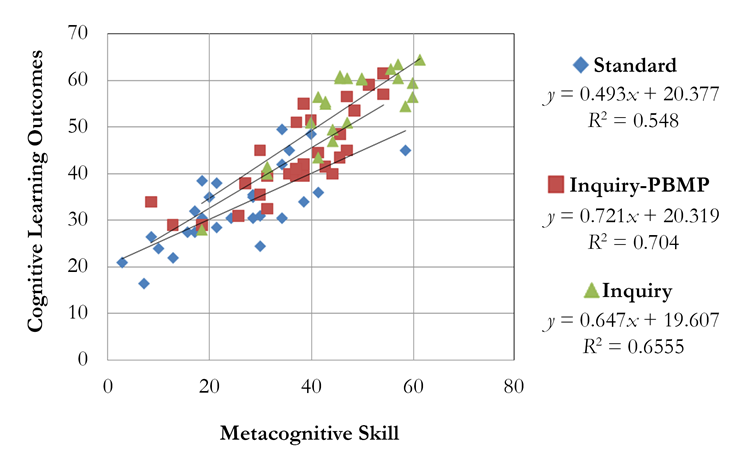
Exploring the Correlation Between Metacognitive Skills and Cognitive Learning Outcomes Across Various Biology Learning Models in High Schools
Abstract
In Malang City, a notable observation within the realm of high school biology education suggests a prevalent lack of metacognitive knowledge among teachers, hindering their efficacy in nurturing students' metacognitive capacities. Such deficiency yields implications for diminished cognitive abilities among students. Recognizing this, there emerges a pressing need for an enhanced pedagogical framework capable of fostering metacognitive skills adeptly. One promising approach involves integrating inquiry-based learning and problem-based mindful pedagogy (PBMP). This amalgamation is anticipated to synergistically harness the potential of both methodologies in bolstering metacognitive skills alongside cognitive learning outcomes. This study adopts a correlational research design, wherein data encompassing metacognitive skills and cognitive learning outcomes are systematically gathered. Methodologically, the evaluation entails the integration of metacognitive skills assessments with cognitive learning outcome metrics. Subsequent analysis is conducted via regression analysis, employing a significance threshold of 5%. Statistical examination is facilitated through the utilization of SPSS 17.0 for Windows. The findings of the analysis unveil a discernible relationship between metacognitive skills and cognitive learning outcomes across distinct biology lessons. Notably, the extent of metacognitive skill contribution to cognitive learning outcomes exhibits variance. Particularly noteworthy is the pronounced impact observed within the Inquiry-PBMP class setting, indicating its superiority over alternative pedagogical models in cultivating metacognitive skills and subsequently augmenting students' cognitive learning achievements.
Keywords
Full Text:
PDFReferences
Ainley, J., Pratt, D., & Hansen, A. (2006). Connecting engagement and focus in pedagogic task design. British Educational Research Journal, 32(1), 23–38. https://doi.org/10.1080/01411920500401971
Amnah, S. (2011). Pembelajaran think pair share, keterampilan metakognitif, dan hasil belajar kognitif siswa SMA. Jurnal Ilmu Pendidikan, 17(6), 489–493. http://dx.doi.org/10.17977/jip.v17i6.2882
Ardila, C., Corebima, A. D., & Zubaidah, S. (2013). Hubungan keterampilan metakognitif terhadap hasil belajar biologi dan retensi siswa kelas X dengan penerapan strategi pemberdayaan berpikir melalui pertanyaan (PBMP) di SMAN 9 Malang (Undergraduated thesis, Universitas Negeri Malang, Malang, Indonesia). Retrieved from https://repository.um.ac.id/24892/
Atunasikha, L. (2010). Hubungan keterampilan metakognitif dan pemahaman konsep siswa laki-laki dan perempuan kelas IV SDN Penanggungan Malang pada pembelajaran sains dengan strategi pembelajaran PBMP dan think pair share (TPS) (Doctoral dissertation, Universitas Negeri Malang, Malang, Indonesia). Retrieved from https://repository.um.ac.id/24732/
Bahri, A. (2010). Pengaruh strategi pembelajaran RQA pada perkuliahan fisiologi hewan tehadap kesadaran metakognitif, keterampilan metakognitif dan hasil belajar kognitif mahasiswa jurusan biologi FMIPA UNM (Master thesis, Universitas Negeri Malang, Malang, Indonesia). Retrieved from http://mulok.lib.um.ac.id/index.php?p=show_detail&id=44446
Baran, M., & Maskan, A. K. (2011). A study of relationships between academic self concepts, some selected variables and physics course achievement. International Journal of Education, 3(1), E2. https://doi.org/10.5296/ije.v3i1.586
Bencze, J. L., & Bowen, G. M. (2001). Learner-controlled projects in science teacher education: Planting seeds for revolutionary change. In Annual Meeting of the American Educational Research Association, Seattle, WA.
Beyer, B. K. (1997). Improving student thinking: A comprehensive approach. Boston, MA: Allyn and Bacon.
Borich, G. D. (2007). Introduction to the thinking curriculum. In A. C. Ong & G. D. Borich (Eds.), Teaching strategies that promote thinking: Models and curriculum approaches. Singapore: McGraw-Hill.
Boyle, B., Lamprianou, I., & Boyle, T. (2005). A longitudinal study of teacher change: What makes professional development effective? Report of the second year of the study. School Effectiveness and School Improvement, 16(1), 1–27. https://doi.org/10.1080/09243450500114819
Camahalan, F. M. G. (2006). Effects of self-regulated learning on mathematics achievement of selected Southeast Asian children. Journal of Instructional Psychology, 33(3), 194–205.
Collins, N. L., & Miller, L. C. (1994). Self-disclosure and liking: a meta-analytic review. Psychological Bulletin, 116(3), 457.
Corebima, A. D. (2009). Jadikan peserta didik pebelajar mandiri. In Seminar Nasional Pendidikan, Himpunan Mahasiswa Jurusan Biologi FMIPA UNM, Makassar, Indonesia.
Corebima, A. D., & Bahri, A. (2011). Reading, questioning, and answering (RQA): A new learning strategy to enhance student metacognitive skill and concept gaining. In International Symposium at Nanyang Technology University, Singapore.
Coutinho, S. A. (2007). The relationship between goals, metacognition, and academic success. Educate~, 7(1), 39–47.
Cuevas, P., Lee, O., Hart, J., & Deaktor, R. (2005). Improving science inquiry with elementary students of diverse backgrounds. Journal of Research in Science Teaching: The Official Journal of the National Association for Research in Science Teaching, 42(3), 337–357. https://doi.org/10.1002/tea.20053
Dantonio, M., & Beisenherz, P. C. (2001). Learning to question, questioning to learn: A guide to developing effective teacher questioning practices. Boston, MA: Allyn and Bacon.
Duffy, G. G., Roehler, L. R., & Herrmann, B. A. (1988). Modeling mental processes helps poor readers become strategic readers. The Reading Teacher, 41(8), 762–767.
Dunlosky, J., & Metcalfe, J. (2008). Metacognition. Thousand Oaks, CA: Sage Publications.
Dunning, D., Johnson, K., Ehrlinger, J., & Kruger, J. (2003). Why people fail to recognize their own incompetence. Current Directions in Psychological Science, 12(3), 83–87. https://doi.org/10.1111/1467-8721.01235
El-Anzi, F. O. (2005). Academic achievement and its relationship with anxiety, self-esteem, optimism, and pessimism in Kuwaiti students. Social Behavior and Personality, 33(1), 95–104. https://doi.org/10.2224/sbp.2005.33.1.95
Flavell, J. H. (1976). Metacognitive aspects of problem solving. In L. B. Resnick (Ed.), The nature of intelligence. Hillsdale, NJ: Erlbaum.
Howse, R. B., Lange, G., Farran, D. C., & Boyles, C. D. (2003). Motivation and self-regulation as predictors of achievement in economically disadvantaged young children. The Journal of Experimental Education, 71(2), 151–174. https://doi.org/10.1080/00220970309602061
Kahn, P., & O’Rourke, K. (2005). Understanding enquiry-based learning (EBL). In T. Barrett, I. MacLabhrainn, and H. Fallon, (Eds.), Handbook of enquiry and problem-based learning: Irish case studies and international perspectives. Galway, Ireland: Centre for Excellence in Learning and Teaching, National University of Ireland.
Kanselaar, G. (2002). Constructivism and socio-constructivism. Retrieved from http://kanselaar.net/wetenschap/files/Constructivism-gk.pdf
Kosnin, A. M. (2007). Self-regulated learning and academic achievement in Malaysian undergraduates. International Education Journal, 8(1), 221–228.
Kristiani, N. (2005). Penerapan pembelajaran inkuiri untuk meningkatkan kerja ilmiah dan motivasi belajar siswa kelas II SMA Negeri 5 Malang pada pokok bahasan alat indera. In Pelatihan PTK, MGMP Biologi Kota Malang, Malang, Indonesia.
Kristiani, N. (2008). Biologi kelas X. Jakarta, Indonesia: Inter Mitra Group.
Kristiani, N. (2009). Pengaruh strategi pembelajaran dan kemampuan akademik serta interaksinya terhadap kemampuan metakognisi dan hasil belajar kognitif siswa kelas X di SMA Negeri 9 Malang (Doctoral dissertation, Universitas Negeri Malang, Malang, Indonesia). Retrieved from https://repository.um.ac.id/60282/
Kristiani, N. (2015). Hubungan keterampilan metakognitif dan hasil belajar kognitif siswa pada pembelajaran saintifik dalam mata pelajaran biologi SMA kurikulum 2013. In Biologi, sains, lingkungan, dan pembelajarannya. Proceedings of the Seminar Nasional XII Pendidikan Biologi FKIP UNS (pp. 513-519). Surakarta, Indonesia.
Kristiani, N., Susilo, H., Rohman, F., & Aloysius, D. C. (2015). The contribution of students’ metacognitive skills and scientific attitude towards their academic achievements in biology learning implementing Thinking Empowerment by Questioning (TEQ) learning integrated with inquiry learning (TEQI). International Journal of Educational Policy Research and Review, 2(9), 113–120. http://dx.doi.org/10.15739/IJEPRR.020
Kruger, J., & Dunning, D. (1999). Unskilled and unaware of it: How difficulties in recognizing one’s own incompetence lead to inflated self-assessments. Journal of Personality and Social Psychology, 77(6), 1121–1134. https://doi.org/10.1037/0022-3514.77.6.1121
Lin, X. (2001). Designing metacognitive activities. Educational Technology Research and Development, 49(2), 23–40. https://doi.org/10.1007/BF02504926
Listiani, N. W., Wiarta, I. W., & Darsana, I. W. (2014). Penerapan model pembelajaran metakognitif berbasis masalah terbuka berpengaruh terhadap hasil belajar matematika siswa kelas V SD Gugus 8 Blahbatuh. MIMBAR PGSD Undiksha, 2(1). https://doi.org/10.23887/jjpgsd.v2i1.2264
Livingston, J. A. (2003). Metacognition: An overview (Reports Descriptive No. 141). https://files.eric.ed.gov/fulltext/ED474273.pdf
Mardana, I. G. (2011). Pengaruh model pembelajaran berbasis masalah (problem based learning) terhadap prestasi belajar fisika dan keterampilan berpikir kritis ditinjau dari bakat numerik. Jurnal Pendidikan dan Pembelajaran IPA Indonesia, 1(1), 242.
Mustaqim, S. B., Abdurrahman, A., & Viyanti, V. (2013). Pengaruh keterampilan metakognitif terhadap motivasi dan hasil belajar melalui model problem based learning (PBL). Jurnal Pembelajaran Fisika Universitas Lampung, 1(5), 120280.
O’Neil Jr, H. F., & Abedi, J. (1996). Reliability and validity of a state metacognitive inventory: Potential for alternative assessment. The Journal of Educational Research, 89(4), 234–245. https://doi.org/10.1080/00220671.1996.9941208
Palmquist, B. C., & Finley, F. N. (1997). Preservice teachers’ views of the nature of science during a postbaccalaureate science teaching program. Journal of Research in Science Teaching: The Official Journal of the National Association for Research in Science Teaching, 34(6), 595–615. https://doi.org/10.1002/(SICI)1098-2736(199708)34:6%3C595::AID-TEA4%3E3.0.CO;2-I
Peraturan Menteri Pendidikan dan Kebudayaan No. 59 Tahun 2014. (2014, July 02). Retrieved from https://peraturan.go.id/id/permendikbud-no-59-tahun-2014
Perry, N. E., Hutchinson, L., & Thauberger, C. (2007). Mentoring student teachers to design and implement literacy tasks that support self-regulated reading and writing. Reading & Writing Quarterly, 23(1), 27–50. https://doi.org/10.1080/10573560600837636
Peters, M. (2000). Does constructivist epistemology have a place in nurse education?. Journal of Nursing Education, 39(4), 166–172. https://doi.org/10.3928/0148-4834-20000401-07
Rivers, W. P. (2001). Autonomy at all costs: An ethnography of metacognitive self‐assessment and self‐management among experienced language learners. The Modern Language Journal, 85(2), 279–290. https://doi.org/10.1111/0026-7902.00109
Sabilu, M. (2009). Pengaruh penggunakan jurnal belajar dalam pembelajaran multistrategi terhadap kemampuan kognitif dan metakognitif siswa SMA Negri 9 Nalang/Murni (Doctoral dissertation, Universitas Negeri Malang, Malang, Indonesia). Retrieved from https://repository.um.ac.id/60270/
Schraw, G. (1998). Promoting general metacognitive awareness. Instructional Science, 26, 113–125. https://doi.org/10.1023/A:1003044231033
Simmons, P. E., Emory, A., Carter, T., Coker, T., Finnegan, B., Crockett, D., ... & Labuda, K. (1999). Beginning teachers: Beliefs and classroom actions. Journal of Research in Science Teaching: The Official Journal of the National Association for Research in Science Teaching, 36(8), 930–954. https://doi.org/10.1002/(SICI)1098-2736(199910)36:8%3C930::AID-TEA3%3E3.0.CO;2-N
Siswati, B. H. (2014). Hubungan antara keterampilan metakognitif dengan hasil belajar siswa berkemampuan akademik berbeda pada pembelajaran biologi yang menerapkan beberapa model pembelajaran (Doctoral dissertation, Universitas Negeri Malang, Malang, Indonesia). Retrieved from https://repository.um.ac.id/60412/
Skaalvik, E. M., & Skaalvik, S. (2010). Teacher self-efficacy and teacher burnout: A study of relations. Teaching and Teacher Education, 26(4), 1059–1069. https://doi.org/10.1016/j.tate.2009.11.001
Syamsuri, I. (2017). ESPS & simple modern biologi untuk SMA/MA kelasa X (1). Jakarta, Indonesia: Erlangga.
Taylor, S. (1999). Better learning through better thinking: Developing students’ metacognitive abilities. Journal of College Reading and Learning, 30(1), 34–45. https://doi.org/10.1080/10790195.1999.10850084
Yamin, M. (2008). Paradigma pendidikan konstruktivistik: Implementasi KTSP dan UU no. 14 tahun 2005 tentang Guru dan Dosen. Jakarta, Indonesia: Gaung Persada Press.
Zimmerman, B. J., & Pons, M. M. (1986). Development of a structured interview for assessing student use of self-regulated learning strategies. American Educational Research Journal, 23(4), 614–628. https://doi.org/10.3102/00028312023004614
Jurnal Pendidikan Sains Journal of Science, Mathematics, and Vocational Education Graduate School Of Universitas Negeri Malang JPS is licensed under Creative Commons Attribution-ShareAlike 4.0 International License |






